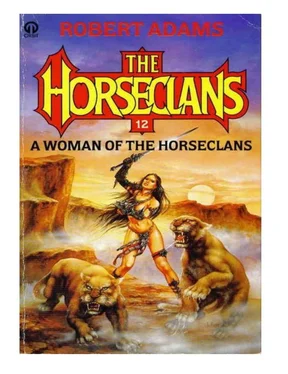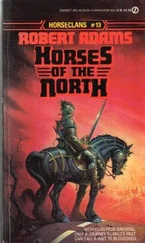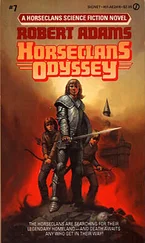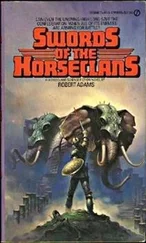Robert Adams - A Woman of the Horseclans
Здесь есть возможность читать онлайн «Robert Adams - A Woman of the Horseclans» весь текст электронной книги совершенно бесплатно (целиком полную версию без сокращений). В некоторых случаях можно слушать аудио, скачать через торрент в формате fb2 и присутствует краткое содержание. Жанр: Фантастика и фэнтези, на английском языке. Описание произведения, (предисловие) а так же отзывы посетителей доступны на портале библиотеки ЛибКат.
- Название:A Woman of the Horseclans
- Автор:
- Жанр:
- Год:неизвестен
- ISBN:нет данных
- Рейтинг книги:4 / 5. Голосов: 1
-
Избранное:Добавить в избранное
- Отзывы:
-
Ваша оценка:
- 80
- 1
- 2
- 3
- 4
- 5
A Woman of the Horseclans: краткое содержание, описание и аннотация
Предлагаем к чтению аннотацию, описание, краткое содержание или предисловие (зависит от того, что написал сам автор книги «A Woman of the Horseclans»). Если вы не нашли необходимую информацию о книге — напишите в комментариях, мы постараемся отыскать её.
A Woman of the Horseclans — читать онлайн бесплатно полную книгу (весь текст) целиком
Ниже представлен текст книги, разбитый по страницам. Система сохранения места последней прочитанной страницы, позволяет с удобством читать онлайн бесплатно книгу «A Woman of the Horseclans», без необходимости каждый раз заново искать на чём Вы остановились. Поставьте закладку, и сможете в любой момент перейти на страницу, на которой закончили чтение.
Интервал:
Закладка:
After sight and smell of the thoroughly hoof-trampled expanse of half-frozen, fecal-laced mud that one night of sheltering a large proportion of the horse herd had made of the area of the camp inside the palisade, the chiefs had made the decision to erect another palisade adjoining the existing one for the horses and another of a different configuration for the pregnant ewes, certain chosen rams and the best of the younger ewes. Only the milk goats would be kept as before in the confines of the human settlement. It would be up to the cattle to fend off the wolves themselves, any of them that got past the roving herd guards.
Throughout the next night, small fires were kept blazing all along the lines which had been traced by Chief Milo and then cleared of snow and ice. Thus, in the morning, when the still-warm ashes were scraped aside, those narrow stretches of ground were not frozen like all the rest of the topsoil for many miles in every direction, so the digging of the trenches to take the palisade limbers went far more quickly and easily than any of the folk had expected or had had any right to expect at this time of year.
Parties with carts were sent back to the wooded areas to seek out and bring back as much thorny or prickly brush as they could find, and when the palisade stakes had been erected, the ground around them thoroughly soaked and given the time to freeze, the children were set to the task of weaving the brush thickly between and around the stakes as high as they could reach easily, at which point adults took over and continued for as long as the supplies of brush held out.
“Not that the brush will stop those gray devils,” Chief Milo had remarked, and the next snow will mean that we’ll have to fetch back more brush and raise the height of it again. But at least it might serve to slow the wolves down enough to let someone put an arrow into them before they can get at the horses or the sheep.
“As for the cattle and the rest of the sheep, it might be best to drive them all closer to camp, maybe to where we had the horse herd; the herd guards will have an easier life thus, and in the event that that super-pack strikes at the cattle, we—more of us—will be able to get to the herd to help in killing the wolves or driving them off, and do it in much less time than we could now, with the herds way out there.
“Of course,” he confided to the other chiefs gathered in Dik Krooguh’s yurt, “if that pack is big enough we could easily, few as we number, lose every head of stock and have a hard fight to keep even our own lives and a few horses. It has happened before, in past years, to other nomads—Kindred and non-Kindred—and some of the smaller, more isolated Dirtman settlements, too, have been wiped out or at least ruined by one of these huge packs during a hard winter.
“Our warriors and striplings and maiden-archers who are not assigned to the herds had better start steeping in shifts, so that two-thirds of the total numbers of effectives are always available, for those big packs hunt both by day and by night when their bellies are growling, and the only things that will stop them are food, a full blizzard or death.”
The Lainuh Krooguh who returned to the Staiklee yurt was a sullen, silent woman who never spoke unless addressed and then only in monosyllables. No one was comfortable in her presence, and she left the yurt only when forced to do so by her natural functions, for she did no work of any kind, only crouched near the firepit, scowling and brooding in utter silence, ignoring all the other occupants of the yurt.
As a consequence, Bettylou was distinctly relieved when she was told by Tim to move their effects to the yurt of Chief Dik, that she might be instructed by the chiefs wives in how to properly run the domicile of a clan chief. Dahnah and Nansee, without even being asked, helped her to gather the clothing and gear and sleeping-rugs, and then lug them—slipping and sliding on the uneven footing frozen beneath the thin blanket of fresh snow—over to the Clan Krooguh chiefs yurt, then arrange them where and as directed by Dik Krooguhs first wife, Mairee.
When Bettylou had thanked the helpful women and they had departed, she set about the task of unrolling her sleeping-rug and coverings. There was no point in unrolling Tim’s, for until the wolf threat abated, he would be at the herders’ camp both night and day.
The two thicknesses of carpeting were placed on the ground, with sheepskins atop them, then the two woolen blankets and, finally, the bearskin Djahn Staiklee had gifted. As she unrolled and laid this treasure out, all three of Chief Dik’s wives—Mairee, Dohrah and Djohn—came over to stroke and admire the rarity.
“It’s not so thick and dense as a winter pelt would’ve been,” remarked Mairee. “but even so, when once it’s been properly lined, one entire chest is going to be required to store and transport it. I’ll tell old Tchahrlz to start making you that chest; he should line it with cedarwood, which seems to help to keep vermin out, and it ought, really, to be bound and decorated in brass or silver or both together. Perhaps your Tim will luck into some of those metals on one of next year’s raids.”
“There’ll be no need to raid for metals if we camp in one of the ruins, as we did ten years ago,” remarked Dohrah. “We must have dug up three or four wagonloads of various metals in those ruins that were called Haiz.”
“Yes and I doubt not that we could’ve found even more had the chiefs allowed us to bide in the ruins themselves, not just camp out on the prairie and ride over every day for a few hours,” added Djohn.
Mairee shook her head. “You should not criticize the decisions of the chiefs, nor should you doubt the rightness of their judgments, sister. Do not forget just how the ancient folk died who made the settlements that have since become those ruins their homes. Uncle Milo himself has warned over and over again that the seeds of those terrible plagues still sleep here and there in parts of every ruin, dormant, but still no less deadly to the careless or the unwary.
“Remember what those horses in that small feral herd we had to join our Krooguh herd told us, years back? How the entire clan—men, women and children—died, all within a week, after camping among ruins? True, they were not a Kindred clan, but I doubt that those plague seeds discriminate between Kindred and non-Kindred folk. Nor do our chiefs, which is why they would never allow a camp to be established very close to a ruined place of ancient settlement.”
With all three of his wives doing duty as matron-archers—one sleeping and two keeping watch at the palisades—Chief Milo took food with Chief Dik that night and, with wolves and wolf packs on the mind of everyone present, he began to talk of wolves, to reminisce of his various encounters with the canny predators over his many, many years of life.
“In the world that existed before this one of ours, you know, in the most of this land, at least, the true wolf was all but extinct. Very few of them were left, and most of those were either not living truly wild and free or were not of pure wolf bloodlines.
“In the immediate aftermath of the deadly calamities that befell that ancient world and its millions of human inhabitants, there were no wolf packs in any of the areas I was able to visit, but rather numerous and highly dangerous hordes of starving dogs—dogs of all shapes and sizes and breeds, all now ownerless, masterless, having little or no fear of mankind and having kept alive so far, since most of them utterly lacked hunting skills, by feeding off dead or dying human cadavers.
“I had some very close brushes with a few of those dog packs, back then, but fortunately very few of those dogs lived long enough to breed more of their kind. As soon as the millions of human corpses were gone and the dogs had to compete with the equally numerous feral felines and the truly wild animals for such food as existed, they lost out and died off in droves; also, those few humans as had lived through the plagues in many cases hunted the dogs for meat and skins to replace worn-out clothing and footwear.
Читать дальшеИнтервал:
Закладка:
Похожие книги на «A Woman of the Horseclans»
Представляем Вашему вниманию похожие книги на «A Woman of the Horseclans» списком для выбора. Мы отобрали схожую по названию и смыслу литературу в надежде предоставить читателям больше вариантов отыскать новые, интересные, ещё непрочитанные произведения.
Обсуждение, отзывы о книге «A Woman of the Horseclans» и просто собственные мнения читателей. Оставьте ваши комментарии, напишите, что Вы думаете о произведении, его смысле или главных героях. Укажите что конкретно понравилось, а что нет, и почему Вы так считаете.












